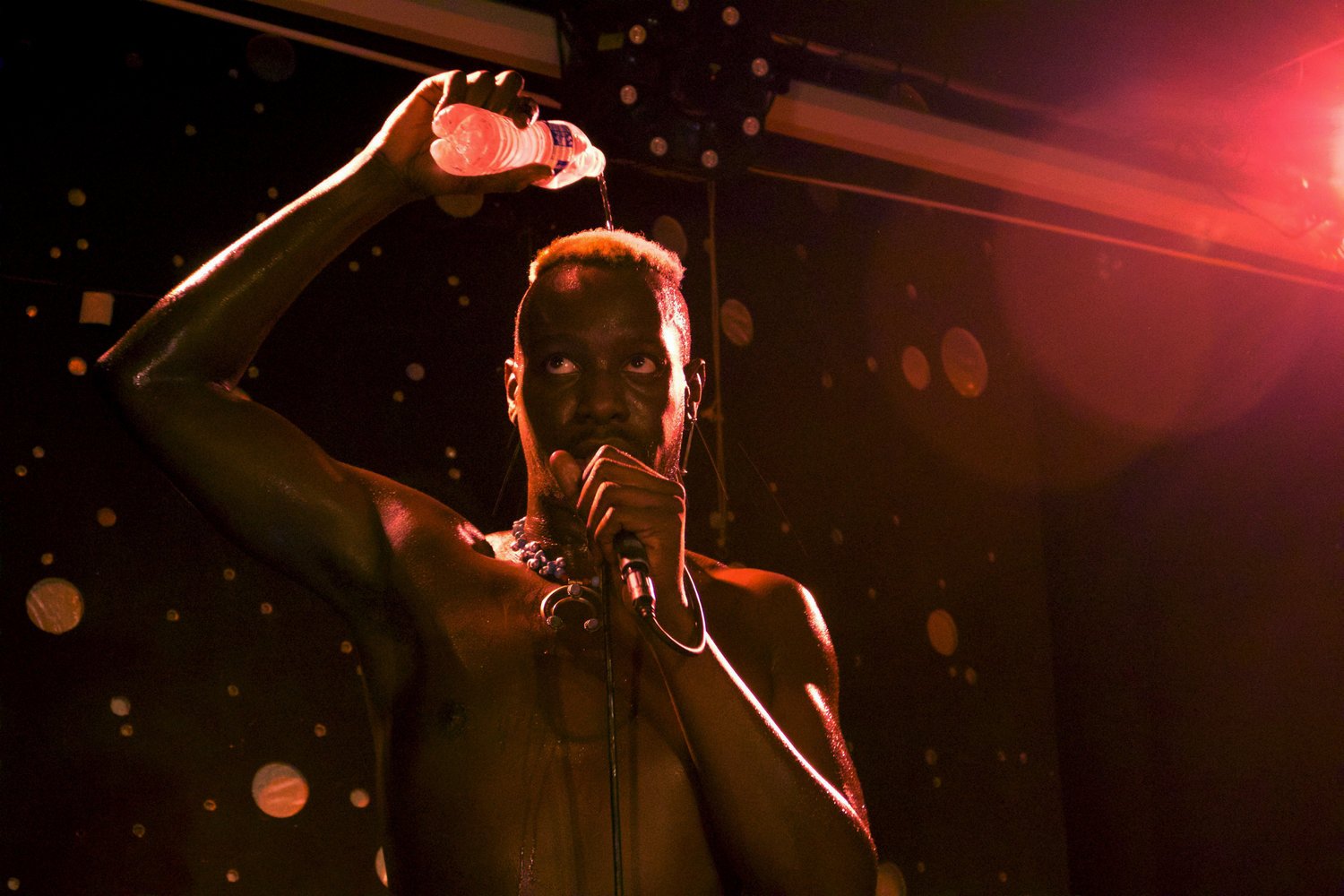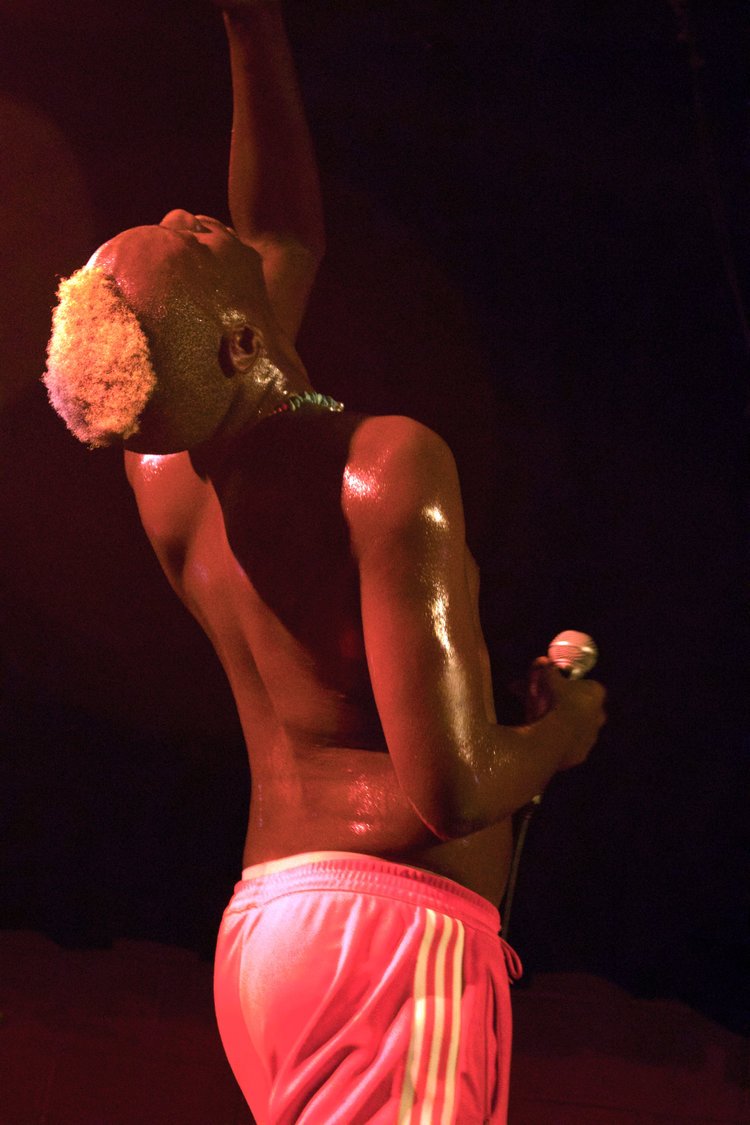Le1f and the Transformative Power of Hip-Hop
PHOTO: SHEPHERD RAY
Whenever feeling completely claustrophobic while working in tiny kitchens, I would blast Le1f on high. His music would cut through the air and make room for me, sometimes literally, as it made certain individuals uncomfortable.
He mixes a heavy beat, radio cool, windows down, driving with Hot 107 and then bam, you get flamboyance, twirl, and more confidence than fight night with lyrics like “I’m a butterfly, bitch.”
Seeing him live is all voodoo and transformative power. He comes on stage dressed in what looks to be a cute, cut-off, high fashion jumper, which is quickly stripped off, to frame his self-love with sweat and bright orange, Adidas striped sweats. His music speaks and aligns for him just as his identity swirls from aggressive to femme to bump and sex like a ritualistic vibe.
I am initially surprised that this small, queer-claimed bar in the grass-rooted Bull City is not packed to its brim, flowing out to the street, but then again, I am also surprised why I haven’t heard “Wut” on the god damn radio.
There is a lot of talk going on about representation of queer and black artists in TV and film, yet we are still dealing with sometimes blatant, other times quiet, homophobia in hip-hop.
It is time to start seeing this continuously revolutionary genre as a matriarch.
“I don’t know what queer is, is it even a thing anymore? If it is, I hope that it can be inclusive for someone like me…”
While Cardi B and Nicki fight, can we just take a second and realize that if hip-hop/rap has always been about owning you, respect, telling it like it is, loving on your story and your presence and not afraid of battle, then you gotta make room for Mama, you gotta make room for sissies and fairies, high low medium femmes of all shades and shapes, but even more stressing- black men who cross their legs, hold their dick, gloss and shine, throw shade and sometimes wear it. You have to make room for the lyrics, “they want me to blend in like real tree, but I can’t, I gosta do me.”
Le1f should never have to conform to a queer audience either because black straight men can’t love on a song, and white gays are doing whatever they are doing, going to pride. It makes no sense that feminine men are put down in gay circles or not as desired, and masc identities are celebrated but then this aggressive, very masculine sound mixed with explosive, empowered, fag loving lyrics is taboo.
“I’m a man’s man, literally.”
Le1f is a conversation, multiple conversations, stacks of Ivy league thesis papers on feminism and hip-hop. A dialogue that we keep bringing up but can’t quite seem to break through on.
The opening act, Tennis Rodman, a young, black man, openly identifying as straight, ends on the words, “I don’t know what queer is, is it even a thing anymore? If it is, I hope that it can be inclusive for someone like me..”
I literally felt the crowd gag a bit when he said is it even a thing anymore. It had me thinking though, like where are we going?
Where am I going?
I am in this bar, no genders on the bathroom doors cause we don’t play that, high platform shoes and smiles.
I am sober.
I am sober in a bar.
That’s a decade and a half of communicating in these beautiful spaces with these beautiful people, intoxicated. That’s a decade and a half of being touched when intoxicated, nevermind saying, “hello, how are you, my name is Francis.”
That’s years of creating, cultivating, and defining family and then waking up to a smoldering forest. Walking through the char pretending it ain’t gone, looking for relics in the smoke.
Is it gone?
Its moments of complete loss, it’s a baseline of infinite strength, flashes of doubt, sadness pounding like a headache, driving around with Sade and a candle.
Is this grief? Is this textbook?
I close my eyes and his music is drawing in my head. Khalif is on a clay dragon, surfing, spitting fire. He is in a tree made of yarn adorned by little birds. I open them- he is on the floor, the crowd surrounding him as he lay there, mic to his lips, legs crossed.
Then he performs Umami/Water. His presence elevated in love. The song slows for a second, into a trance of awareness, other worldly and sitar, heavy. He leans all the way back and lets the light glisten and shimmer on his sweat. His arms slither, intertwining like a deity.
“You were born to do it,” then the beat hits back, “I hate bottled water but I love the way bottle water taste.”
Afterwards he laughs and asks for bottle water to wash his asshole.
It’s 2am, I am sitting in my car, staring at downtown Durham and the selfie of Khalif and I. I don’t know where to go, but I need gas. Head to a spot that is packed, crawling out onto the street and into the gas station parking lot. Strange, that this is what I had pictured for the show or at least the amount of people, and the sense of celebration. I also notice though while the numbers on the gas meter are scrolling, everybody is pretty drunk.
Seems like the m.i.a in our community are at home. Whether they are sober or not, they’re hurting, they’re tired.
Heard Raquel Willis say something like, after the election, sure we weren’t that surprised but we got to it, working overtime.
We’re so strong, we radiate.
So strong, even when we rest, you can hear our melodic breathing.
—
Shepherd Ray (Mangogna) also lovingly referred to as Light Bulb is a trans-masculine identified, mixed media artist and writer.
Archive
- February 2025
- November 2024
- October 2024
- September 2024
- August 2024
- July 2024
- June 2024
- May 2024
- April 2024
- October 2023
- July 2023
- June 2023
- May 2023
- April 2023
- March 2023
- February 2023
- June 2022
- April 2022
- March 2022
- January 2022
- December 2021
- October 2021
- September 2021
- August 2021
- July 2021
- June 2021
- May 2021
- April 2021
- March 2021
- February 2021
- January 2021
- December 2020
- October 2020
- September 2020
- August 2020
- July 2020
- June 2020
- May 2020
- April 2020
- March 2020
- February 2020
- January 2020
- December 2019
- November 2019
- October 2019
- September 2019
- August 2019
- July 2019
- June 2019
- May 2019
- April 2019
- March 2019
- February 2019
- January 2019
- December 2018
- November 2018
- October 2018
- September 2018
- August 2018
- July 2018
- June 2018
- May 2018
- April 2018
- March 2018
- February 2018
- January 2018
- December 2017
- November 2017
- October 2017
- September 2017
- August 2017
- July 2017
- June 2017
- May 2017
- April 2017
- March 2017
- February 2017
- January 2017
- December 2015
- November 2015
- October 2015
- September 2015
- August 2015
- July 2015
- June 2015
- May 2015
- April 2015









